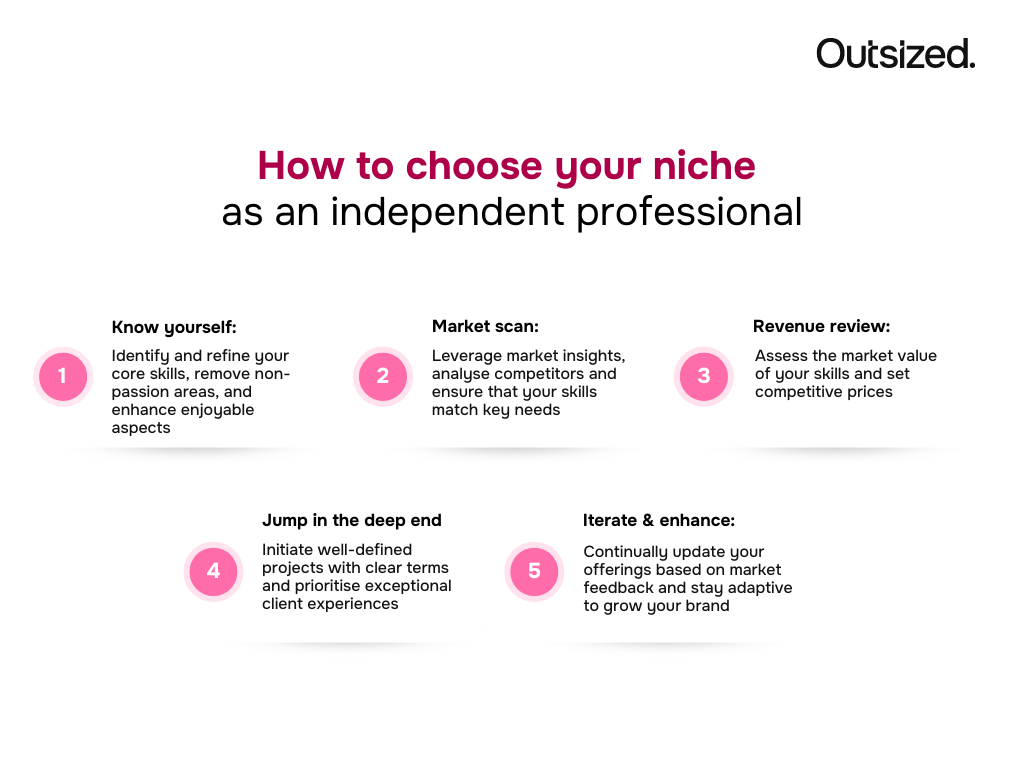You've made the leap. After years of building expertise and relationships within a company, you're...
Find your superpower: How to choose your niche as an independent professional?

If you’re building a business as an independent professional, you’ve probably spent some sleepless nights thinking about how you can choose your niche. Questions like: What services do I offer? Should I pick an industry or stay general? What about my offer? The truth is, niching is complicated and, for most of us, it takes some time to figure out.
Its super important to choose the right niche because, as an independent professional, being able to market yourself effectively is key to your long-term success. That means you can’t be everything to everybody. You have to narrow down your focus in order to grow your business and your revenue.
In this blog, we will guide you through how to go about narrowing down your unique niche.

Types of niching
Vertical niching
Vertical niching involves focusing on a specific industry or market segment. In this approach, you become an expert in the unique challenges, needs, and regulations of that particular sector. Many independent professionals lean on their past employment experience to niche vertically because they have such rich lived experience in the industry.
Example: Imagine you are an independent professional specialising in marketing. If you choose a vertical niche, you might focus exclusively on the healthcare industry. You would tailor your services to address the specific marketing needs of healthcare providers, hospitals, and medical device companies.
Pros:
- Deep expertise: You develop a deep understanding of the industry, which can set you apart as a true expert
- Targeted marketing: Your marketing efforts can be highly specific, making it easier to reach and attract clients within the industry
- Higher value: Clients may be willing to pay a premium for your specialised knowledge and experience
Cons:
- Limited market: Your potential client base is restricted to one industry
- Economic vulnerability: If the industry faces a downturn, your business could be significantly impacted
Horizontal niching
Horizontal niching involves focusing on a specific service or solution that can be applied across multiple industries. You become known for a particular skill set or type of service that is valuable to various sectors.
Example: Using the same marketing specialisation scenario, a horizontal niche might involve further specialising in social media strategy. Your expertise in social media marketing would be relevant to businesses in healthcare, technology, retail, finance, and more.
Pros:
- Broad market: You can target a wide range of industries, increasing your potential client base
- Flexibility: Your business is less affected by downturns in any single industry
- Versatile skills: You build a versatile skill set that can adapt to different markets and client needs
Cons:
- Less specialisation: You might not develop the deep, industry-specific expertise that a vertical niche provides
- Broader marketing: Your marketing messages must appeal to a diverse audience, which can be more challenging
Where do you begin when choosing your niche?
Step 1: Know yourself: Identify your strengths and interests
To choose your niche as an independent professional, start by taking a piece of paper and listing the skills you excel at. Don’t worry if you’re not a top expert in them. Reflect on past roles and responsibilities. Which projects did you manage or contribute to that were successful? What were your coworkers complimenting you on? What sorts of problems did your manager ask you to solve?
"Remember that there’s no pressure to focus on a skill just because you’re good at it. Take a look at the list you’ve put together and strike off any skills that you won’t be excited about developing further. After all, you’re the one calling the shots. Try to break down that skill into components that could feel more rewarding."
For example, let’s say you’re a rockstar at project management but can’t stand Gantt charts or similar PM tools. It might be a good idea to think about other areas of expertise that require stellar organisation, communication, and time management.
Once you’ve identified your strengths, consider the types of clients you’d like to work with. Would you be excited about serving the travel industry, or maybe manufacturing, banking, non-profits? For now, just write down some ideas based on your interests, and don’t worry about how they may or may not intersect with your skill set.
From contact to contract – How can you win clients as an independent professional?
Here are some questions to guide you:
- What do I have deep experience in?
- What do I enjoy doing?
- Who were my favourite people to work with?
- What comes easiest to me, but others find hard?
- What did I get the most compliments from when I was employed?
- What is difficult or unnatural for me?
- What auxiliary skills can I bring to the table? (Creativity, project management, etc.)
Copy and paste these questions into a doc and spend some time reflecting.
Step 2: Research the market: Client & competition
Are they willing to pay?
In business, there are two kinds of problems: painkillers and vitamin pills. Clients are willing to pay top dollar for painkillers, whereas vitamin pills are very hard to sell up the chain.
Now it’s time to see which of your skills and interest pairings are painkillers, i.e., how they intersect with market needs. It’s important that your expertise and offer are perceived as highly valuable to everyone within the organisation.
Through research, you’ll find out the best place to offer your services. For example, if you’re skilled at managing digital transformations, you’ll find that the demand for your skills is high in the manufacturing industry and that these projects tend to have long work cycles, bringing in greater revenue.
One of the best places to get started uncovering this information is through industry reports. Outsized recently released its annual Talent on Demand report, which investigated the skills which were in highest demand in 2023. Global consulting firms often have a dedicated area for insights and research on their website where you can search for information on your preferred industry. You can also check out websites of business schools for relevant, published research, as well as information from market research firms such as Nielsen. Additionally, government agencies often provide useful demographic data that can help independent professionals understand customer demand.
Learn from your competitors
You don’t need to reinvent the wheel when you are starting your independent business. Look at what others in your industry (or parallel industries) are doing and try to identify gaps that you can fill. Frankly, if you choose a profitable enough niche, you can simply do what has already been done. The fact is that you bring your unique expertise and experience to the table, and that is uncopyable!
Step 3: Evaluate profitability
At this point, you’ve figured out that someone’s ready to buy what you’re selling. But are you going to be able to hit your financial goals?
"Know the market value of your skill set in your chosen industry and resist the urge to undercharge. The fact is that freelance pricing is all over the map. You can have one independent professional charging $100/hr and another $500/hr for the same service. Your task is to find the sweet spot, where you have room to raise your prices as you gain experience, but you are not pricing yourself too low."
One place you can start is researching the salaries for full-time roles. You can scan sites like Indeed and compare salary expectations as well as role descriptions. Keep in mind that these ranges apply to full-time positions and that independent professionals tend to demand higher fees.
Next, think about how many clients you’d need, and how long the project cycles are. Would you work with a single client yearly, or would you have to sign new clients and project-hop every few months to earn enough? Remember, the shorter the project scopes, the more often you will have to hunt for new clients.
Experiment with different pricing strategies that can help you get to where you want to be financially. For example, you can choose to bill hourly, per project, on a retainer basis, or opt for a performance-based model.
Step 4: Time to jump in the deep end
Now it’s time to take action! Start things off with a project that has well-defined payment terms, timeline, and deliverables.
Many fresh independent professionals focus on delivering but neglect an equally important aspect of the job—client experience. How your client feels during the process of working with you is just as important as what they get at the end of it. A strong client experience can build relationships that can lead to additional work, referrals, and positive reviews—all things that help you grow your business.
Once you have a couple of projects under your belt, you can refine your offerings or your strategy before moving forward. Remember, you haven’t committed to anything—even if you already have a website and updated your LinkedIn. This is the time where you can freely pivot according to what works and what doesn’t. You make the rules!
Step 5: Refine and revisit
Building a successful freelancing business involves a lot of trial and error, so it’s perfectly normal to find yourself back at the drawing board. Remember that your specialisation is your superpower and stay focused on finding that sweet spot between your skills, interests, and what the market needs.
By following these steps, you can effectively narrow down and choose your niche as an independent professional and build a personal brand that resonates with your target audience. Remember, your niche is not set in stone; it can evolve as you gain more experience and insights. Stay flexible, keep learning, and continue to refine your approach to ensure long-term success as an independent professional.
About the author
Humaira Parveen is the Community Manager at Outsized, leading the team that is responsible for engaging with our independent talent platform members. Humaira has been instrumental in the launch of the Community, as well as in the development of curated perks and value-add services for our talent.


.png?height=200&name=Insight%20articles%20correct%20size%20(6).png)